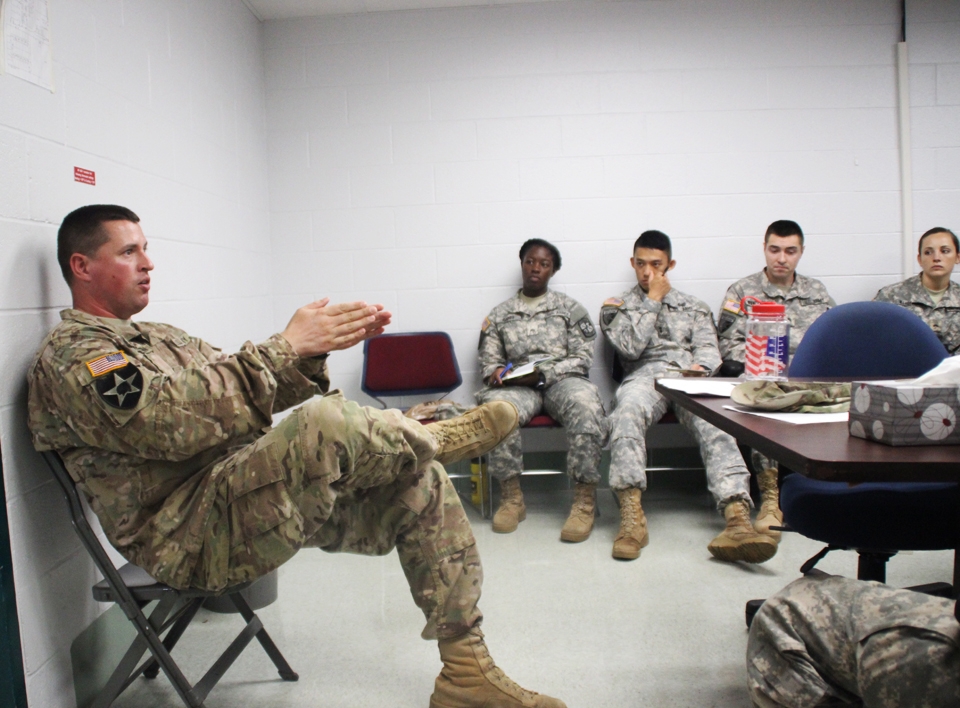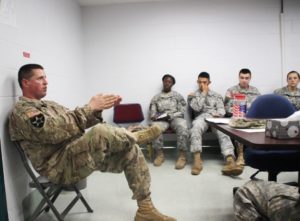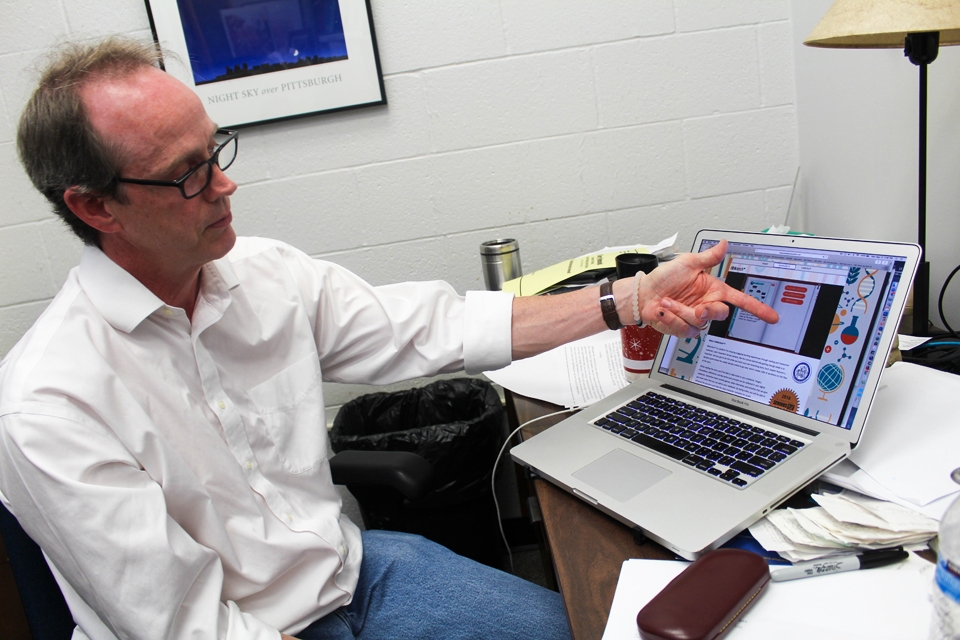

Sgt. First Class James Henderson teaches a class at the Army ROTC’s Three Rivers Battalion training on Sept. 17.
Brandon Addeo | News Editor
According to statistics from the Department of Defense, 6,083 soldiers reported being a victim of sexual assault in 2015. Local ROTC students learned how to prevent sexual assaults this past Saturday — skills which can also translate to campus life.
On Saturday, Reserve Officers’ Training Corps (ROTC) cadets of the Army’s Three Rivers Battalion, which includes universities such as Duquesne, Point Park and the University of Pittsburgh, participated in sexual assault prevention training at the Army Reserve Center near Highland Park.
Several dozen cadets participated in the event, which is completed once each year. Training courses — lasting about 30 minutes each — covered everything from equipment inspection and weapon marksmanship to classes in equal opportunity, suicide prevention and a course in the Army’s Sexual Harassment Assault Response and Prevention (SHARP) program.
Sexual assault has become an issue in the armed forces, according to Sgt. First Class James Henderson, a military science instructor for the ROTC at Pitt.
“In the military, we have a serious problem with sexual assault,” Henderson said. “Frankly, it’s been an embarrassment. I’ve been embarrassed of some of the things that have happened in the military.”
The Army’s SHARP Program offers soldiers and ROTC cadets two options for reporting sexual assault — unrestricted and restricted reporting. The latter option allows victims to receive medical attention and counseling without triggering an investigation — while remaining confidential.
While the military has sexual assault trouble, college campuses also have problems.
At college campuses, all sexual assault allegations are filtered through the university’s Title IX office. Title IX coordinator Sean Weaver said students who are victims of sexual assault should seek medical attention immediately, making sure not to bathe or change clothes to preserve evidence of the assault.
Weaver said he works with Duquesne sexual assault victims in person.
“In all sexual misconduct situations, I contact the student … to request a meeting,” he said. “During that meeting, my goal is to ensure that the student is in a safe place and whether the student needs any University resources or available accommodations.”
At Duquesne, if a Title IX report is made, the university must investigate the incident, whether or not the victim wants it to be done. Victims may ask for confidentiality in the report, though doing so can “limit the university’s ability to respond to the complaint,” Weaver said, though he added all resources — including medical and counseling services — are available to all victims, regardless of confidentiality.
Additionally, the Title IX office can take “interim” measures for victims and alleged assailants, such as implementing “no contact” orders, moving students to different Living Learning Centers and possibly temporarily suspending suspected attackers from university housing, according to the Duquesne student handbook.
In 2014, the most recent data available, there were no sexual assaults reported at Duquesne, though there were six cases of dating violence reported, according to the 2015 Duquesne Security and Fire Safety Report. At Pitt, in 2014, there were 20 rapes reported on campus, along with five cases of dating violence, according to 2015 crime statistics from Pitt’s Public Safety Department.
Laura Summers, a prevention supervisor at Pittsburgh Action Against Rape, said those numbers are likely lower than the actual rates.
“We actually know nationwide [that] sexual violence is vastly underreported,” Summers said.
According to the Rape, Abuse & Incest National Network (RAINN), 80 percent of college women ages 18 to 24 who have been sexually assaulted chose not to report the crime.
ROTC students said college culture needs to change to prevent assaults and encourage reporting.
Cadet Capri Gaines, a political science and urban studies major at Pitt, said victims can sometimes be afraid of being shamed by others.
“A lot of times people are afraid of the repercussions, that they might experience some retaliation for speaking up or speaking out, and a lot of times people feel they’re in a situation where the victim might be blamed,” Gaines said. “We need to make sure people understand that it’s not the victim’s fault and [that] people always have a choice.”
Cadet Michael Caruso, a graduate student in Duquesne’s school of leadership, said bystanders witnessing a sexual assault take place need to intervene.
“There’s a lot of people who see [sexual assault] and accept it as normal, especially in college, [like] at like a college party,” Caruso said. “You just got to step in and make the right call, even if it’s borderline you have to call it.”
Summers said intervening in a possible sexual assault can be a simple as distracting the attacker.
“We don’t have to put our own safety in jeopardy, but we have to think more critically about interrupting the situation,” she said.
Summers added that people tend to blame the victim and not the assailant.
“There’s a lot of victim blaming in our society and a lot of questions asked when a victim comes forward,” she said. “I would ask that people are respectful and helpful and not blaming if this happens to one of their loved ones.”
Duquesne has also formed an ad hoc sexual assault committee, whose members hail from places like Duquesne’s Title IX office, Public Safety, Counseling and Residence Life. The committee is “actively engaged in reviewing policies and procedures” relating to sexual assault education and prevention, according to Duquesne spokeswoman Bridget Fare.
In the past, committee members have helped institute empowerment and self-defense training for female student-athletes — something they would like to make available to the whole campus, Fare said.
The committee is also currently conducting a study on sexual violence. 116 Duquesne students have been placed in focus groups of about 10 people each, whose responses regarding sexual violence and campus life will be used to “identify common themes” for future sexual assault education programs, according to Fare.




